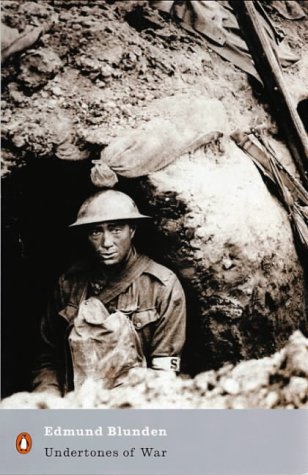
Ward McBurney sends us this poem inspired by Frye and his Merton College tutor and Great War Poet, Edmund Blunden.
Browsing Genius
She stops beside a book stall and she finds
a copy of her lover’s tutor’s book:
Undertones of War. It costs a dime,
and all around her, all she need is look
to see Toronto choked with veterans,
wheezing past her whizz-bang attitude
that after all it’s twenty years since then,
and youth will have its sway and certitude
that past is past is passed is passed away.
O Helen, in your hand you held a friend
ravished by particulars, whose fate
was to smile and quietly unsay
that the war to end all never ends
until we hold in hand the hands of mates
long since buried under soil. So Frye
took decades to search out his brother’s grave –
Eraytus Howard – where his mother paused
her life on permanent no-need-reply:
to whom it may concern please Jesus save
this brother who you never are and was.
Blunden was a genius; so were you,
but he saw you and you blindsided him
with academic fireworks and true
to form he smiled and let you win
the laurels that a soldier poet knows.
Bound with brows of time and in the din
of battle blasted memory he goes,
that shepherd who had gathered Howard in.
Another poem after the break.

Undertones of War, the book that Helen Kemp picked up––Edmund Blunden’s autobiography of his traumatic WWI experience––has recently been reissued by the University of Chicago Press. It includes a selection of Blunden’s war poems. Readers of Ward McBurney’s terrific poem might be interested in two letters to Frye from Blunden, spurred by Frye’s having sent his Oxford tutor a copy of Fearful Symmetry. During his second year at Oxford, Frye had been urged by Blunden to postpone the writing of his Blake thesis and concentrate on the “school”s–the examinations for his degree.
c/o Times, Printing House Square, London, E.C.4.
6 Novr. 1947. With great pleasure I received the book this morning, and with perplexity––for I leave today with family for Japan and am in the same old Christmas tree condition as when once in the Elder War we were about to move . . . . I think that I will have the book kept safely for my return when I can sit down to it with the necessary library in reach and then I’ll write you a proper letter of thanks. You will know I still recall vividly yr. devotion to Blake at Oxford and I rejoice in the spectacle of such constancy of imaginative endeavour––in these days of rapid zests and desertions. We all read Miss Sitwell’s first eloquent appreciation of the Blake [Edith Sitwell, “William Blake,” Spectator 179 (10 October 1947): 466] which must have been a most welcome press cutting. I’ve been away from T.L.S. latterly but know that a review is in hand there. [“Elucidation of Blake” by an anonymous reviewer appeared in TLS, 10 January 1948: 25] Hope you are well and merry. Merton is unchanged in much, but men come & go: you will have heard that H.W. Garrod, who seems the exception, has had his portrait done by R. Moynihan for the panelled room where you attended Collections. It’s a speaking likeness, & a work of art. [Garrod, a classics scholar, was a fellow at Merton College for more than sixty years.] Every good wish, & thanks indeed. EBlunden.
Two months later, Blunden wrote again:
U.K. Liaison Mission, British Embassy, Tokyo, 31 Jan. 1948
My dear Norrie
About the time when Miss Sitwell was giving your Blake the right send off in England and while a review was in gestation for the Times Lit. Supp. I was hurriedly getting my bits and pieces in order (and it is a job to get anything done even slowly in England lately) for my appointment here. I do not know whether I shall be able to receive the copy you so handsomely sent for me before my return to England & that may be a year away; but probably another copy will be coming out here among new books acquired for Tokyo needs, and I look forward to sitting with your final interpretations in that copy. W.B. has a way of reaching Japan also. May you be receiving lots of interesting appreciations of this long matured essay.
Observe that my escape from teaching was a fantasy! For I am lecturing and chattering and scrawling away in that service almost more than ever. The Foreign Office thought that someone from England should come out to help in the revival of studies in Japan & the Supreme Commander approved. This venture appears to be well liked by the Japanese, but I have the personal advantage of finding many old friends still alive and some of them eminent in the university world here. [Blunden had been a professor of English at the University of Tokyo, 1924–27.] Moreover I have a small daughter who is impudence aged 2 and I am wicked enough to let her do some charming.
Jack Garrett like yourself remains part of my Merton for my time. [Garrett was a Rhodes scholar from Alberta, who studied at Merton College, 1937–40; he taught at the University of Alberta, the University of Toronto, and Canterbury College in New Zealand.] You heard that we lost poor Deane Jones [fellow of Merton College from 1921 until his death in 1947] with frightful suddenness. He drove himself with a sort of religious intensity. Garrod’s letter to me just received is a proof that Fellows Quad stands, and that a steady flow of irony and double negatives is available there.
I must break off––Guests for supper, conversation will include Blake, and Oxford.
Best thanks and wishes
Yours ever
EBlunden
Many thanks, Bob, for finding and posting these.